| Listing 11 - 20 of 20 | << page >> |
Sort by
|
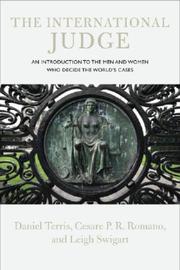
ISBN: 9781584656661 1584656662 9780199238736 0199238731 Year: 2007 Publisher: Waltham, Mass. Brandeis University Press
Abstract | Keywords | Export | Availability | Bookmark
 Loading...
Loading...Choose an application
- Reference Manager
- EndNote
- RefWorks (Direct export to RefWorks)
International law --- Judges. --- International courts. --- Justice, Administration of. --- Juges --- Tribunaux internationaux --- Justice --- Administration --- Judges --- International courts --- Justice, Administration of
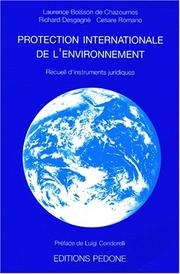
ISBN: 2233003268 9782233003263 Year: 1998 Publisher: Paris : Pedone,
Abstract | Keywords | Export | Availability | Bookmark
 Loading...
Loading...Choose an application
- Reference Manager
- EndNote
- RefWorks (Direct export to RefWorks)
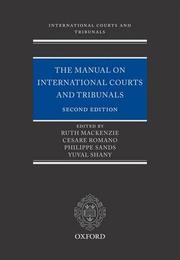
ISBN: 9780199545278 0199545278 Year: 2010 Publisher: Oxford ; New York : Oxford University Press,
Abstract | Keywords | Export | Availability | Bookmark
 Loading...
Loading...Choose an application
- Reference Manager
- EndNote
- RefWorks (Direct export to RefWorks)
International courts --- 341.55 --- Nd1 --- Rf3 --- International tribunals --- Tribunals, International --- Courts --- Jurisdiction (International law) --- International courts. --- Tribunaux internationaux.
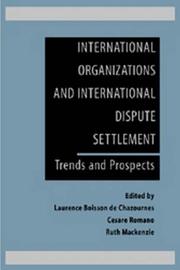
ISBN: 1571052739 Year: 2002 Publisher: Ardsley (N.Y.) Transnational Publishers
Abstract | Keywords | Export | Availability | Bookmark
 Loading...
Loading...Choose an application
- Reference Manager
- EndNote
- RefWorks (Direct export to RefWorks)
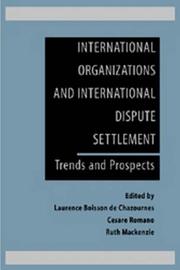
ISBN: 9789004479227 9781571052681 Year: 2002 Publisher: Leiden; Boston : Brill | Nijhoff
Abstract | Keywords | Export | Availability | Bookmark
 Loading...
Loading...Choose an application
- Reference Manager
- EndNote
- RefWorks (Direct export to RefWorks)
This book contains the thoughts of officials of international organizations and NGOs, member of judicial bodies, and academics on the role of international organizations and the settlement of contentious cases before international judicial bodies. The timely work will undoubtedly be of interest to practitioners and scholars who are involved in issues related to cases before international judicial bodies. Published under the Transnational Publishers imprint.
Book
Year: 2010 Publisher: Oxford University Press
Abstract | Keywords | Export | Availability | Bookmark
 Loading...
Loading...Choose an application
- Reference Manager
- EndNote
- RefWorks (Direct export to RefWorks)
Book
ISBN: 9782233004826 2233004825 Year: 2005 Publisher: Paris Pedone
Abstract | Keywords | Export | Availability | Bookmark
 Loading...
Loading...Choose an application
- Reference Manager
- EndNote
- RefWorks (Direct export to RefWorks)
Book
ISBN: 0191707651 9780191707650 Year: 2004 Publisher: Oxford : Oxford University Press,
Abstract | Keywords | Export | Availability | Bookmark
 Loading...
Loading...Choose an application
- Reference Manager
- EndNote
- RefWorks (Direct export to RefWorks)
In response to the weaknesses of international tribunals and domestic courts in the prosecution of crimes such as genocide crimes against humanity and war crimes, a generation of 'internationalised' criminal courts has been established. This text covers three active & one putative jurisdiction of this kind.
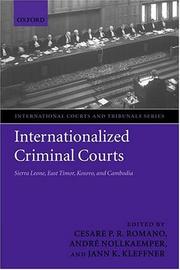
ISBN: 0199276730 9780199276738 Year: 2004 Publisher: Oxford: Oxford university press,
Abstract | Keywords | Export | Availability | Bookmark
 Loading...
Loading...Choose an application
- Reference Manager
- EndNote
- RefWorks (Direct export to RefWorks)
Book

ISBN: 9781538178379 Year: 2023 Publisher: Lanham : Rowman & Littlefield,
Abstract | Keywords | Export | Availability | Bookmark
 Loading...
Loading...Choose an application
- Reference Manager
- EndNote
- RefWorks (Direct export to RefWorks)
Scientists are supposed to have freedom to choose and conduct their experiments and exchange their ideas. Known as scientific freedom, this idea has been implicated in both wonderful and terrible scientific discoveries. Although it is not new, it has great relevance to contemporary society. In a time of genetic editing, global warming, and a worldwide pandemic, the question of how freely science is and should be conducted is one that has significant practical consequences. Drawing on rigorous interdisciplinary methods, this book defines the concept of scientific freedom, tells its story, and asks on what basis scientific freedom is best justified. Based on international human rights law and philosophy, the authors develop a model of scientific freedom as a constitutive element of the human right to enjoy the benefits of the progress of science and its applications. To illustrate its usefulness, they then test and apply this model to a real-life and real-time case study, as well as to two highly important international human rights instruments.
Science --- Science. --- Research. --- Research --- Academic freedom. --- Human rights. --- Sciences et société. --- Philosophie des sciences. --- Sciences --- Recherche. --- Recherche --- Liberté d'expression dans l'enseignement supérieur. --- Liberté de l'enseignement. --- Droits de l'homme. --- Social aspects. --- Philosophy. --- Political aspects. --- Aspect politique. --- Philosophie. --- Aspect politique
| Listing 11 - 20 of 20 | << page >> |
Sort by
|

 Search
Search Feedback
Feedback About UniCat
About UniCat  Help
Help News
News